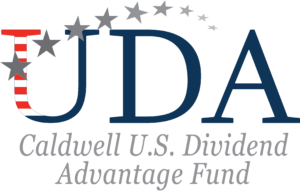September Recap:
For the month of September, the Caldwell U.S. Dividend Advantage Fund (“UDA” or “Fund”) declined -4.5% versus a decline of -4.8% for the S&P 500 Total Return Index (“Index”)¹. From a sector standpoint, Energy, Healthcare, and Financials were relative outperformers, whereas, Real Estate, Information Technology, and Consumer Discretionary underperformed.
Top performers in the month of September were Powell Industries (“POWL”), Costco (“COST”), and FedEx (“FDX”). POWL performed well as the company is seeing strong order momentum from the Energy and LNG (Liquefied Natural Gas) markets, which is driving significant backlog growth, including work booked into the year 2025. COST rerated higher as it reported strong earnings facilitated by continued strength in customer traffic trends as well as steady membership renewals. Its continued execution and consistency in the currently volatile retail environment have stood out to investors. FDX exceeded earnings expectations by achieving continued progress on its expense reduction and rightsizing initiatives, despite the declining freight volumes due to a tough economic backdrop.
During the month of September, the Fund initiated positions in Pioneer Natural Resources (“PXD”), Eli Lilly and Co. (“LLY”), Murphy USA (“MUSA”), McKesson (“MCK”), Phillips 66 (“PSX”), Ares Management (“ARES”), Marathon Petroleum (“MPC”), Brown & Brown (“BRO”), and Powell Industries (“POWL”). PXD is an independent oil and gas exploration and production company. The company is experiencing productivity gains that have allowed it to lower its outlook for capital expenditures for the year. LLY is involved in the development, manufacturing, and sale of pharmaceutical products. Its newer product portfolio is showing good prospects for fuelling growth, resulting in its earnings per share growth estimates to compare favourably versus its peers. MUSA is a leading marketer of retail fuel and convenience merchandise through a network of over 1,700 gas stations, which are typically located near Walmart stores. Being a low-cost leader, the company is poised to benefit from the recent elevated gas price environment. MCK is one of the largest distributors of prescription medicines and surgical supplies in North America with an approximate share of one-third of the U.S. wholesale prescription drug market. The company has been demonstrating good execution over the last few quarters with its volumes benefitting from growth in obesity drugs. PSX is a diversified energy, manufacturing, and logistics company. Its recent cost-cutting initiatives and higher expected utilization should help the company drive margin improvements going forward. ARES is a leading alternative asset manager with assets under management of over $350 billion. It is primarily focused on private credit but also manages traditional private equity and real asset funds. The company is seeing strong fundraising traction and private credit also benefits from the rising rate environment. MPC is the largest refiner in the U.S., which through its sixteen-refinery system has a crude oil refining capacity of over 3 million barrels per calendar day. The company is set to experience robust demand as the global refining capacity is tight given the closures in the U.S. and Europe. Furthermore, current inventory levels for refined products are near the 5-year lows. BRO is a leading insurance broker specializing in the commercial middle market space. It also acts as a managing general agent to insurers that outsource their underwriting function and provides wholesale services to smaller brokers with limited marketing and placement capabilities. The rising re-insurance rates suggest continued robust insurance pricing and BRO, being a broker, benefits from higher insurance pricing without incurring the underwriting risks. POWL designs, manufactures, and markets custom-engineered products and systems that are mainly used to control electrical energy and other critical processes. The company is seeing strong momentum from the Energy and LNG markets, which is driving significant backlog growth.
For the third quarter of 2023, UDA declined -1.8% versus a decline of -1.2% for the Index. FedEx (“FDX”), TJX Companies (“TJX”), and Costco (“COST”) were the leading contributors to performance. FDX was discussed in the monthly section above. TJX rerated higher as it surpassed its quarterly earnings expectations, delivering same-store sales growth of 6% in contrast to the 2% to 3% growth that had been expected. The company’s value proposition resonated with consumers, leading to an increase in foot traffic. COST was discussed in the monthly section above.
The Fund held a 22.8% cash weighting at month-end. While we remain mindful of the macro environment, the Fund employs a bottom-up investment approach designed to seek out attractive investment opportunities in any market. Over the long run, given its unique momentum-driven investment approach and focus on well-managed, dividend growth companies, we believe UDA is well-positioned to provide strong performance by way of both attractive regular monthly distributions and long-term capital appreciation potential. We expect that our approach to dividend growth investing should continue to provide a means of generating compelling risk-adjusted returns for our investors over the long term.
1All returns (for the fund, individual stocks and sectors) are in total return, Canadian dollar terms. All stock returns represent performance for the full period noted. All fund returns are in respect of Series F.
Standard performance as at September 30, 2023:
Caldwell U.S. Dividend Advantage Fund (Series F): 1 Year: 1.9%, 3 year: 6.4%, 5 year: 6.8%, Since Inception (June 19, 2015): 7.4%.
S&P500 Total Return Index: 1 Year: 19.7%, 3 year: 10.6%, 5 year: 10.9%, Since Inception (June 19, 2015): 12.3%.
2Actual investments, first purchased: FDX 2/29/2023, TJX 12/10/2018, COST 11/27/2018.
All data is as of September 30, 2023 sourced from Morningstar Direct or S&P Capital IQ, unless otherwise indicated. Fund returns are from FundData. UDA, Index total return numbers, sector returns and individual stocks returns are in CAD terms. The Fund was first offered to the public as a closed-end investment since May 28, 2015. Effective November 15, 2018 the Fund was converted into an open-end mutual fund such that all units held were redesignated as Series F units. Performance prior to the conversion date would have differed had the Fund been subject to the same investment restrictions and practices of the current open-end mutual fund.
The information contained herein provides general information about the Fund at a point in time. Investors are strongly encouraged to consult with a financial advisor and review the Simplified Prospectus and Fund Facts documents carefully prior to making investment decisions about the Fund. Commissions, trailing commissions, management fees and expenses all may be associated with mutual fund investments. Rates of returns, unless otherwise indicated, are the historical annual compounded returns including changes in unit value and reinvestment of all distributions and do not take into account sales, redemption, distribution or optional charges or income taxes payable by any unitholder that would have reduced returns. Mutual funds are not guaranteed; their values change frequently and past performance may not be repeated. The payment of distributions should not be confused with a fund’s performance, rate of return or yield. If distributions paid are greater than the performance of the fund, your original investment will shrink. Distributions paid as a result of capital gains realized by a fund, and income and dividends earned by a fund, are taxable in your hands in the year they are paid. Your adjusted cost base (“ACB”) will be reduced by the amount of any returns of capital and should your ACB fall below zero, you will have to pay capital gains tax on the amount below zero.
Publication date: October 19, 2023.

